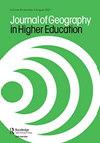高等教育地缘政治的变化:国际学生流入匈牙利的经济影响
IF 1
4区 教育学
Q2 EDUCATION & EDUCATIONAL RESEARCH
引用次数: 4
摘要
摘要本文分析了匈牙利留学生流动对经济的影响。这项研究基于一种创新的方法,不仅显示了基于不同入学学生群体支出的地理经济影响(伊拉斯谟+,自费或奖学金持有者学生的学位流动性),还将数据与国家和地方经济的特定部门联系起来。因此,本文揭示了国际学生流动不仅影响高等教育机构甚至整个高等教育部门的国际化,而且影响更广泛的宏观环境,带有地缘政治因素。根据研究结果,可以确定全球和/或政府“软实力”倡议(如伊拉斯谟+、“一带一路”倡议、匈牙利刺激基金)在经济发展中的新方面或“副作用”。以匈牙利为例,本文旨在更好地理解21世纪高等教育不断变化的地缘政治。本文章由计算机程序翻译,如有差异,请以英文原文为准。
Changing geopolitics of higher education: economic effects of inbound international student mobility to Hungary
ABSTRACT This article analyses the economic impact of inbound student mobility in Hungary. The research is based on an innovative approach not only showing the geoeconomic impact based on expenditures of the different groups of incoming students (Erasmus+, degree mobility of self-funded or scholarship holder students), but also links the data to specific sectors of the national and local economies. Thus, the paper reveals that international student mobility affects not only the internationalization of the higher education institutions or even the entire higher education sector, but also the wider macro environment, carrying geopolitical considerations. Based on the findings, a new aspect or “side effect” of the global and/or governmental “soft power” initiatives (e.g. Erasmus+, Belt and Road Initiative, Stipendium Hungaricum) can be identified in economic development. With the Hungarian case, the article intends to contribute to a better understanding of the changing geopolitics of higher education in the twenty-first century.
求助全文
通过发布文献求助,成功后即可免费获取论文全文。
去求助
来源期刊

Journal of Geography in Higher Education
Multiple-
CiteScore
5.80
自引率
9.50%
发文量
29
期刊介绍:
The Journal of Geography in Higher Education ( JGHE) was founded upon the conviction that the development of learning and teaching was vitally important to higher education. It is committed to promote, enhance and share geography learning and teaching in all institutions of higher education throughout the world, and provides a forum for geographers and others, regardless of their specialisms, to discuss common educational interests, to present the results of educational research, and to advocate new ideas.
 求助内容:
求助内容: 应助结果提醒方式:
应助结果提醒方式:


